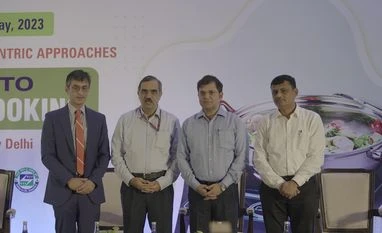To cover urban areas under electric cooking model within 3 years: Ministry
The government plans to come up with aggregation models for electric cooking through which prices can be brought down
)
Photo: Conference on Consumer-Centric Approaches for E-cooking Transition (Credits: Bureau of Energy Efficiency)
Listen to This Article
On World Environment Day, a senior official in the power ministry said that the centre is coming up with aggregation models to accelerate the transition to electric cooking and plans to cover all urban areas within three years. The official was speaking at a conference organised in New Delhi by the Bureau of Energy Efficiency (BEE), the Ministry of Power and CLASP (Collaborative Labeling and Appliance Standards Program).
Ajay Tewari, additional secretary, ministry of power, said that electric cooking must be scaled up and a model needs to be developed so that there is aggregation of carbon credits. The model should work in such a way that it becomes affordable in both urban and rural areas, he added.
“Some people take it very lightly, but e-cooking has many dimensions for families in urban and rural areas. Given our large population, a change in our behaviour can have the biggest impact on the planet,” the official said. "If we have standard and affordable models, we should be able to cover all urban areas within 2-3 years. By 2030, we will like to cover as many households as possible under e-cooking."
“We are going to achieve renewable energy targets much earlier than the timelines we announced. This is evident from our achievement of Nationally Determined Contributions nine years ahead of target and our renewable energy targets,” Tewari said.
At the event, Abhay Bakre, Director General, Bureau of Energy Efficiency said, “We have found that almost all dishes prepared using conventional stoves can be prepared using e-cooking as well. So, what is needed is replication at scale. Our focus has been on kitchens and locations where cooking can happen for longer periods of time, of 8-10 hours per day.”
The government plans to come up with aggregation models for electric cooking through which prices can be brought down. It has been prioritizing e-cooking as it hopes to achieve the aims stated under Mission LiFE (Lifestyle for Environment).. Mission LiFE was launched by Prime Minister Narendra Modi at the 2021 UN Climate Change Conference (UNFCCC COP26) to bring individual behaviors to the forefront of the global climate action narrative. It aims to replace the 'use-and-dispose' economy with a circular economy model, which would be defined by "mindful and deliberate utilisation". The mission seeks to nudge individuals to undertake simple acts in their daily lives that can mitigate climate change.
More From This Section
Topics : Ministry Ministry of Power BS Web Reports BEE
Don't miss the most important news and views of the day. Get them on our Telegram channel
First Published: Jun 05 2023 | 3:26 PM IST
